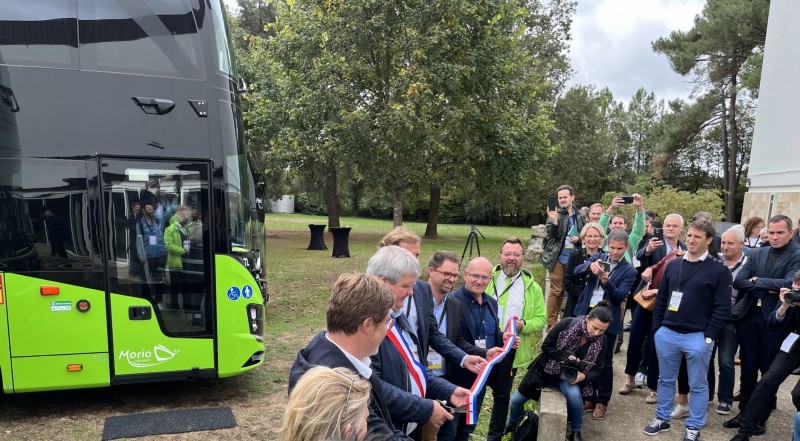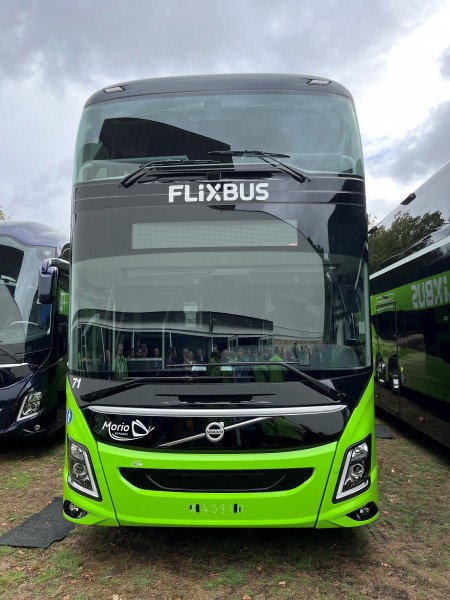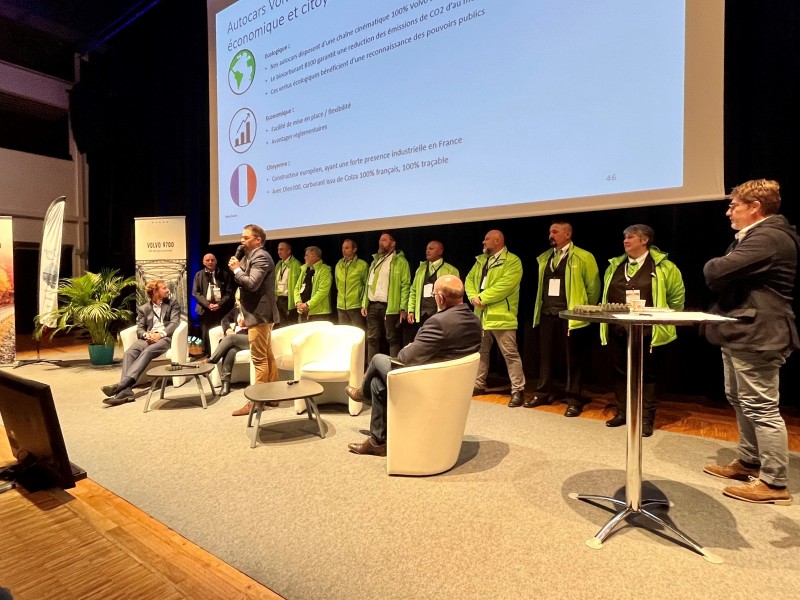1. December 2021
FlixBus launches the longest European bus line running on Colza Biodiesel
+ From September 28th, the FlixBus LN724 Brest <> Grenoble line will become the longest commercial line in Europe running on 100% French biodiesel.
+ Two Volvo Bus 9700 double-decker coaches will run on Oleo100 Biodiesel made from 100% French rapeseed, produced by the French company Saipol (Avril Group).
+ Oleo100 reduces CO2 emissions by almost 70% and fine particle emissions by up to 80%.
+ Volvo Buses and FlixBus announce a cooperation agreement to simplify the development of a sustainable fleet around the world.

Paris/Munich, 29 September 2022 – FlixBus and its holding company Flix SE are committed to making travel as sustainable as possible. One aspect is the implementation of alternative drives. Flix teams up with different partners to pilot and explore new technologies.
The most recent cooperation agreement between FlixBus and Volvo Buses is focused on testing the use of Oleo100 biodiesel, made from colza (rapeseed). Oleo100 fully meets the latest environmental criteria by transforming renewable biomass into fuel. The rapeseed is pressed to obtain, on the one hand, non-GMO (genetically modified organism) vegetable proteins intended for feeding animals on French farms, and on the other hand, rapeseed oil for human consumption.
You can learn more about the project in this video.
Ever greener journeys with FlixBus
With the introduction of coaches running on Oleo100 on the Brest <> Grenoble line, Flixbus enlarges its biofuel footprint in France. Already in November 2021, two Volvo coaches running on Oleo100 were introduced on the FlixBus line Nice <> Toulouse. In June 2022, the FlixBus Vannes <> Paris line started running on Oleo100, also with Volvo vehicles. A daily trip on the route Brest <> Grenoble sums up to 830,000 km traveled each year and to 200,000 liters of fuel consumed. The two Volvo Bus 9700 double-decker coaches that serve the route will run on Oleo100, a biodiesel type made from colza that is produced by Saipol, a French company. By using Oleo100 to power the two Volvo 9700 double-decker buses on this line, 70% fewer greenhouse gas emissions will be produced.
Oleo100 fully meets the latest environmental criteria by transforming renewable biomass into fuel. The rapeseed is pressed to obtain, on the one hand, non-GMO (genetically modified organism) vegetable proteins intended for feeding animals on French farms, and on the other hand, rapeseed oil for human consumption. Only the surpluses of these productions are used for energy purposes, and thus cause neither deforestation nor change of land use. Oleo100 biodiesel (made entirely from French colza seeds) reduces CO2 emissions up to 70% and fine particle emissions up to 80% for a long-distance bus, while offering the same performance as diesel. This is a European first in the field of commercial travel.

Fabian Stenger, COO, Flix SE: “Volvo Bus shares our vision of more sustainable travel and provides premium buses that can guarantee the FlixBus quality that our customers are looking for. There are now five Volvo buses running on Oleo100 throughout France and we are particularly proud of that. All over the world we seek to implement solutions with various partners to reduce the carbon footprint of travel with FlixBus as much as possible. France is a pioneer in this field thanks to ambitious partners such as Volvo Bus, Morio and Saipol”.
Flix and its partners long term commitment towards sustainable travel
Since 2013, the company has been shaping and revolutionizing the global travel market with its brands by enabling people to travel affordably and sustainably. Flix’s development is characterized by steady growth and innovation. By modernizing the industry and driving sustainable pilot projects like biofuel buses, Flix is proving that an entire industry can be transformed by the right entrepreneurial spirit and a motivated team.
The launch of the Brest <> Grenoble line was also the opportunity for FlixBus and Volvo Bus to formalize a new partnership. The two companies will work hand-in-hand to develop more sustainable coach travel by simplifying fleet development for FlixBus partner coach operators around the world.
The cooperation agreement does not mean that Volvo will automatically supply buses to FlixBus. Instead, the vehicles will be provided as required by bus partners operating the FlixBus network.

About Flix
Flix intends to transform the public transport sector by offering sustainable and affordable long-distance bus- and train travel solutions in more than 40 countries across four continents. With its asset-light business model and innovative technology platform, Flix, launched in 2013 swiftly established a market-leading position for long-distance bus travel in Europe, North America and Türkiye and is rapidly expanding further into South America and India through its brands FlixBus, FlixTrain, Kamil Koç, and Greyhound.
Driven by increased awareness for sustainable travel, Flix aims to become carbon neutral in Europe by 2040 and globally by 2050. To assess its progress within a scientifically recognized framework, Flix established near-term targets for emissions reduction with the Science Based Targets initiative.
While Flix manages the commercial side of the business such as network planning, pricing, operations control, marketing and sales, quality management and continuous product development with a data-driven approach, trusted Flix partners conduct the daily operations. The innovative combination of Flix’s technology and sales platform with traditional passenger travel has turned a European start-up into a leading and globally expanding travel tech company.
For more information, please visit corporate.flix.com